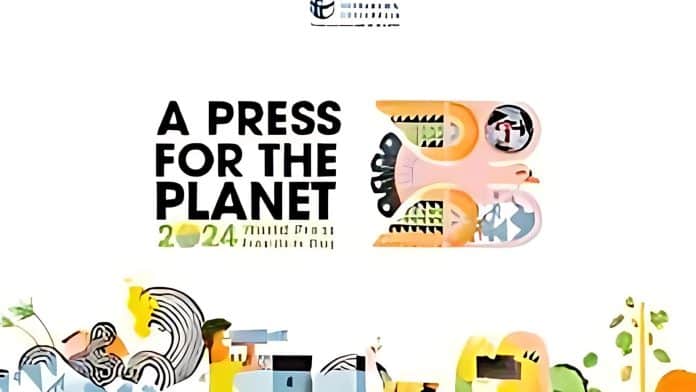In its new report “Press and Planet in Danger”, published on 3 May to mark World Press Freedom Day, UNESCO reveals that 70% of environmental journalists have suffered attacks related to their work.
In a consultation conducted by UNESCO in March 2024 among 900 environmental journalists from 129 countries, more than two-thirds declared that they had suffered attacks, threats or pressure linked to their activities. Of these, two out of five had subsequently suffered physical violence.
“Media workers (…) document environmental degradation, and they provide evidence of environmental vandalism, that helps to hold those responsible to account”, said the UN Secretary-General in his message on World Press Freedom Day. “It is no surprise that some powerful people, companies and institutions, will stop at nothing to prevent environmental journalists from doing their job”, he added.
Attacks on journalists on the rise
This year’s World Press Freedom Day theme is press freedom in the context of the current environmental crisis. Misinformation on these issues can lead to a lack of public and political support for climate action and effective policies and protection for the most affected vulnerable communities.
The UNESCO report on “Press and Planet at Risk” also recalls that between 2009 and 2023, at least 749 journalists and media covering environmental issues were victims of murder, physical violence, detention and arrest, online harassment or prosecution.
The UNESCO Observatory of Murdered Journalists reports at least 44 murders of environmental journalists in the last 15 years, of which only five have resulted in convictions – an alarming impunity rate of almost 90%.
More than 300 attacks took place between 2019 and 2023, an increase of 42% on the previous five years (2014-2018). It is a global problem, with attacks perpetrated in 89 countries in every region of the world.
An issue also in Europe
In his report on “State repression of environmental protests and civil disobedience in Europe,” published in February 2024, Michel Forst, the UN Special Rapporteur on Environmental Defenders under the Aarhus Convention, made several observations about the media in European countries.
“In addition to being denied access to or prevented from filming environmental demonstrations and civil disobedience actions, either by being physically removed from the site (for example, in Portugal) or by being denied access to a narrow street where police had gathered activists and blocked access with police trucks (for example, in Spain), journalists have also been targeted by police, including:
– In France and Spain, where journalists covering environmental protests were arrested, detained and prosecuted as if they were taking part in the demonstration.
– In Poland, Sweden, and the UK, journalists covering environmental protests were also arrested. In Sweden, a journalist was arrested during a climate protest, subjected to a full strip search at the police station, held in custody for six hours and had his equipment confiscated”.
Media workers who risk their lives
“But environmental journalists are not the only ones at risk,” continued Guterres in his message. Around the world, media workers are risking their lives trying to bring us news on everything from war to democracy. I am shocked and appaled by the high number of journalists killed in Israeli military operations in Gaza”.
World Press Freedom Day was established by the United Nations General Assembly in 1993, following a recommendation by UNESCO’s General Conference. From 2 to 4 May, Chile and UNESCO are organizing the 31st World Press Freedom Day Conference.
Towards a global roadmap against climate disinformation
One of the conference’s main outcomes will be a UNESCO global roadmap against climate disinformation, which identifies the roles that governments, the media, universities and researchers, civil society, and digital platforms can play to support and protect environmental journalists and promote the integrity of online information on the environment and climate change.
The World Press Freedom Index, published on 3 May by Reporters Without Borders (RSF), assesses the situation in 180 countries. The situation is best in five northern European countries (Norway, Denmark, Sweden, the Netherlands, and Finland), while Ireland ranks 8th and the United Kingdom 23rd. The five countries where the situation is worst are Syria, Afghanistan, North Korea, Iran, and Turkmenistan. China is also at the bottom of the list on press freedom, ranking 172nd.

